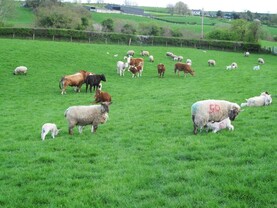On Tuesday, the British newspaper the Guardian carried a story that two Turkish boats had their licences to carry cattle from Ireland revoked. The story quotes Caroline Rowley of Ethical Farming Ireland. Its website claims that dairy cows’ “udders can become engorged and hang heavily causing lameness”. Is this the same Caroline Rowley who was quoted as a member of Compassion in World Farming in another article on live exports in the same publication last month?
An attitude that is hostile to “intensive” animal farming permeates every aspect of the Guardian’s coverage of farming, food production and its relationship with the environment.
For instance, an article on Wednesday 20 February by banking and finance economist Daniela Gabor on the Green Deal proposed by the European Commission blithely states that the money will never reach Polish miners “just as land barons siphoned most of the subsidies originally intended for small farmers under the Common Agricultural Policy”.This utterly ignores the reality of the CAP on family farms in a country like Ireland.
Irony
The irony in all this is that the Guardian is a UK paper, and is primarily speaking to an audience that is leaving the EU.
It’s fair to ask how enlightened the British government’s approach to either family farming or climate change will be. There is little to suggest it will be as ambitious or honest as the EU’s approach.
The early signals point toward a “cheap as chips” food imports policy that will take no account of the carbon footprint of the food. In fairness to the Guardian, it has covered this apparent contradiction.
Meanwhile, the onslaught of one-sided investigation continues. The animal welfare advocates are ideologically opposed to animal farming, and are loading up negative stories to progress a narrative that ultimately leads to the Eat-Lancet world view of humanity being vegan with a significant proportion of food produced synthetically and hydroponically.
Many of the same people led blanket-opposition to GMO technology in farming on the grounds that it was science treating nature and farming as a playground, citing fears of superweeds and genetic mutation threatening civilisation. They now want us to abandon all the learning of modern agriculture, especially animal farming, and lean on laboratory solutions.
It’s breathtaking doublethink, and should be strongly questioned.
Farming must honestly answer the awkward questions being raised. There can be no hiding place for inferior animal welfare standards or practices. Defending the indefensible will only damage the industry. We need a counterweight to the EAT foundation – one that highlights the benefits on animal production on family farms.






 This is a subscriber-only article
This is a subscriber-only article








SHARING OPTIONS: